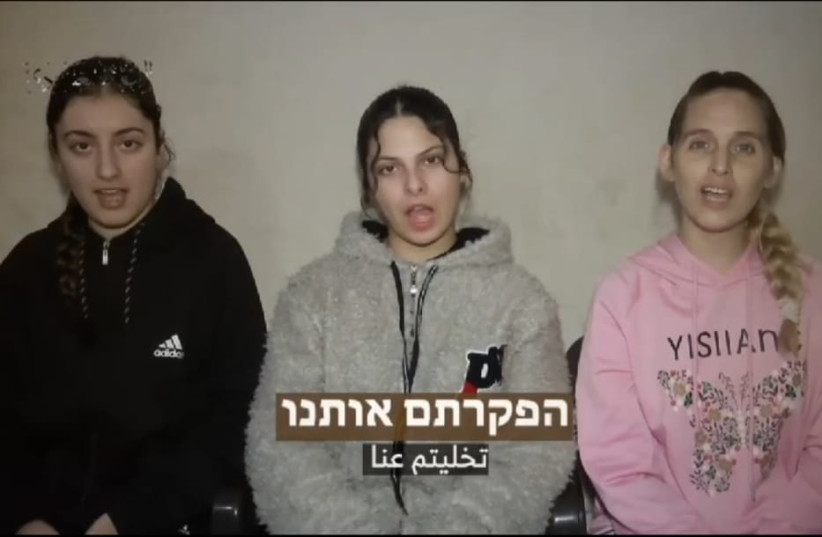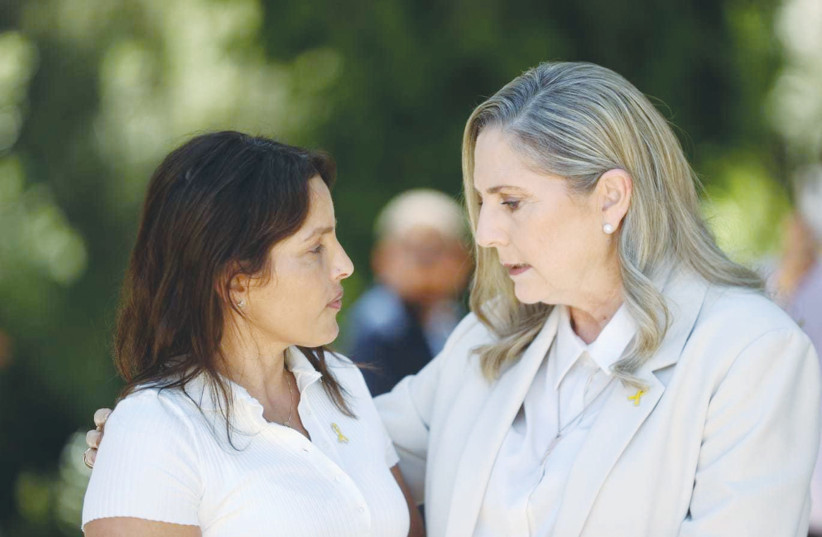(Warning, this article contains graphic descriptions of sexual violence)
A panel of international speakers and experts met for ‘The Global Women's Coalition Against Gender-Based Violence as a Weapon of War’, which was organized by MK Shelly Tal Meron, on Monday at the Knesset in Jerusalem.
The panel featured guests from different countries, including France's Minister for Gender Equality and the Fight Against Discriminations, Aurore Bergé, former French Prime Minister Manuel Valls, Opposition head, Yair Lapid, Syrian-Lebanese/German activist and founder of "ArabsAsk," Rawan Osman, and Steve Maman, Founder of CYCI (The Liberation of Christian and Yazidi Children of Iraq).
UN report
The stated aim of the convention was the establishment of a global united front against the use of sexual violence in war. Such crimes have been reported in multiple countries. The UN’s 2024 report - covering 2023 - detailed incidences of sexual violence in fifteen conflict-related settings: Afghanistan, Central African Republic, Colombia, the Democratic Republic of the Congo, Iraq, Israel and the Occupied Palestinian Territories, Libya, Mali, Myanmar, Somalia, South Sudan, Sudan, Syria, Ukraine, and Yemen. It also listed Ethiopia, Haiti and Nigeria as areas of concern.
The UN reported to the security council on 11 March that there are “reasonable grounds to believe that conflict-related sexual violence — including rape and gang-rape — occurred across multiple locations of Israel and the Gaza periphery during the attacks on 7 October 2023.”
Hostage families
The panelists at Monday’s Knesset conference heard testimonies from family members of hostages who shared stories of sexual violence.
Sasha Ariev, whose younger sister Karina has been held hostage in Gaza for 227 days, spoke of the terror of not knowing her sister's condition and the knowledge of ongoing sexual violence in Hamas captivity: "We have no information about Karina's current health, but we are aware that sexual violence, including rape, is occurring in captivity. I ask all of you, from around the world, to unite in declaring that the use of sexual violence as a weapon of war is unacceptable and that Hamas must release all the hostages - women, men, and children - immediately."
On 26 January, Hamas released a video of Karina, alongside Doron Steinbrecher and Daniella Gilboa. The three women remain in captivity.

Simona Steinbrecher, the mother of Doron, 30, who was also present at the rent, told the panel that her daughter “requires daily medication, which she is likely not receiving”. She said that returned hostages have spoken of the lack of privacy, even when using the shower and toilet, and are under surveillance 24/7.
Mandy Damari, whose 27-year-old daughter Emily remains in captivity as well, spoke of her fears for Emily’s psychological state: "I wonder what thoughts are going through Emily's mind under the total control of her terrorist guards, knowing that it could happen any second if they wished to do anything to her. What sort of psychological or physical threat of real sexual torture and terror is happening to her? I know enough to realize that what she is going through now will never be erased from her memory."
Sasha Ariev spoke of the incidents described in the exclusive New York Times report of 28 December 2023, which were collated from a two-month investigation.
One of the testimonies in The Times is the same one mentioned by Ariev: “[Sapir, a survivor saw] a young woman with copper-color hair, blood running down her back, pants pushed down to her knees. One man pulled her by the hair and made her bend over. Another penetrated her, Sapir said, and every time she flinched, he plunged a knife into her back.”
“She said she then watched another woman “shredded into pieces.” While one terrorist raped her, she said, another pulled out a box cutter and sliced off her breast.
““One continues to rape her, and the other throws her breast to someone else, and they play with it, throw it, and it falls on the road,” Sapir said.”

In the same report, The Times identified at least seven locations where Israeli women and girls were sexually assaulted or mutilated, and reported having viewed photographs of one woman’s corpse with dozens of nails driven into her thighs and groin, and a video showing Israeli female soldiers who had been shot directly in their vaginas.
Journalist Bari Weiss said in January that doctors treating released hostages reported that many, including men, had been sexually abused. The victims were aged between 12 and 48.
She also said that first responders testified that they couldn't identify the gender of bodies, as they were too mutilated.
Zaka volunteers and mortuary workers Simcha Greiniman and Shari Mendes were some to speak of this particular incident, and others, at a conference in the UK in January. Mendes said it was “clear these women died in agony.”
"There were times that they were shot in the head and there was no blood that came out, so they were probably shot after they were dead. It seemed like there was an intentional obliteration of these women’s faces; to erase their faces so their parents or loved ones could not see these people,” she said.
In a previous article with The Jerusalem Post, Shari Mendes spoke of her anger that Israeli women were not afforded the same empathy, anger and global concern as other women, saying that “outrage [was evident in] all previous instances of sexual violence around the world.”
“I did not ask to see rape kits before believing my Yazidi sisters. I believe my sisters from Ukraine, from Kosovo. Because that is what we do with women who are victims of sexual abuse - we believe them.”
Sasha Ariev voiced a similar view at the conference, asking the world to “unite in declaring that the use of sexual violence as a weapon of war is unacceptable.”
The organizer of the conference, Tal Meron, spoke of her intention in forming the conference: “we are declaring today the establishment of an important historical coalition, of acknowledging sexual violence as a crime of war.”
“For the 128 hostages, and especially the 17 women who are still held in Gaza, this reality is going on now for 227 days.”
Whilst she acknowledged that international law recognized sexual violence as a crime, she argued that “cultural and political perception” still needed to change.
